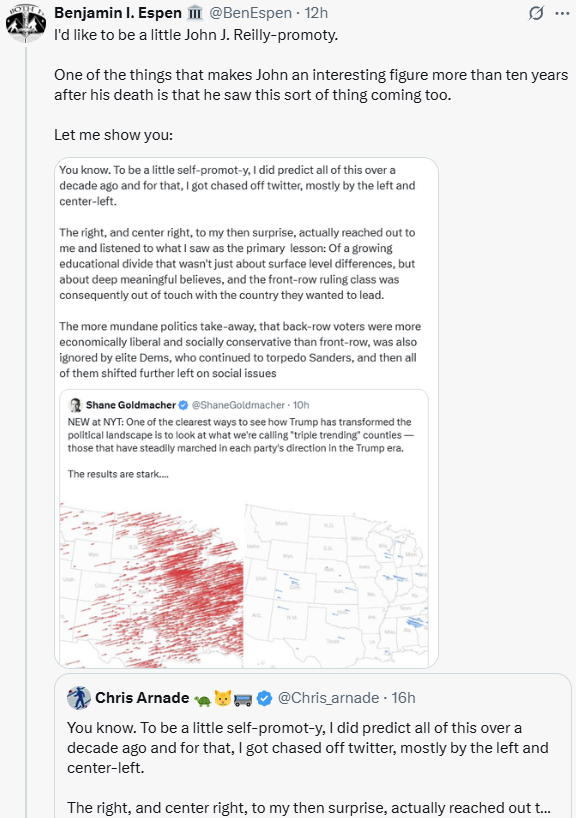The Long View 2004-09-03: Some Comments on the Republican Convention
You can see the first stirrings of what led the Republicans to be blindsided by Trump in this post on the 2004 Republican convention. Even John J. Reilly, staunch Republican, thought the party politics in 2004 were deeply stupid.
Some Comments on the Republican Convention
Do we have any real evidence the Convention actually occurred? I visited the Madison Square Garden area around lunchtime on Thursday. Yes, some major streets were blocked off (to vehicular traffic, not pedestrians), and there were lots of policemen, but no other signs of activity. This was probably just as well: about a quarter of those policemen were so fat that they cannot have been accustomed to patrol duty. I did see a fair number of people with those ID badges that revealed they had Convention business. However, I saw just two people in all of Manhattan who were doing anything overtly political. They stood in front of the Barnes & Noble at Union Square, politely importuning passersby to vote for John Kerry. I thought about asking them for a handout, but thought better of it.
I went into Barnes & Nobles and bought a copy of Northrop Frye's Anatomy of Criticism. Yum.
Actually, the city on Thursday was as deserted as on the slowest summer Sunday. The exception was the area around Washington Square Park, where the eclipse of other business revealed the neighborhood as the college town of New York University. None of the cheerful young people was doing anything related to the Convention.
I continue south to the PATH station at the World Trade Center site. The most interesting thing happening there was that all the fare machines had broken, so people were allowed to go to New Jersey for free. It was this sort of border breach that caused the collapse of East Germany. The Port Authority is oblivious to history, I fear.
* * *
Having watched a few hours of Convention coverage on television, I found the PBS programming the most provocative. This was particularly true of the long sessions with the committee of historians. I was often provoked to think: Is that Michael Beschloss's real head? There seems to be a flap of loose skin on the right side of his neck, just above the collar, which might be peeled off, revealing the antennae and complex eyes beneath.
PBS is worth every penny of your support.
* * *
Last of all, the president spoke.
His domestic proposals, which were supposed to set out a forward-looking program, were numerous, petty, and, for the most part wrong-headed. They were also incompatible: how can you advocate simplifying the tax code while basing almost the whole of your reform of entitlements on the creation of new tax shelters? I cannot judge the politics of this part of the speech. Maybe political consultants know that any speech that promises a long list of specific benefits will be well-received. As policy, though, all those "savings accounts" and tax credits were remarkably irrelevant to what the country actually needs.
One narrow point: both in the president's address, and in New York Governor Pataki's introductory remarks, the account of the events leading to the war in Iraq, and the reasons for it, were simply false. Readers of this blog will know that I regard that war as both justified and inevitable. Nonetheless, the treatment of the matter on the last night of the Convention deserves the ridicule it will receive.
The foreign-policy elements of the president's speech were otherwise unexceptionable, except in this regard: it is not strictly true that "freedom" is on the march. What the United States is promoting, or has the opportunity to promote, is that basic order which makes liberty possible. The Republican cultural program, which defends the central institutions of the human condition, is part of that same impulse, the only path for Western Civilization with a future. In contrast, the party's irresponsibility on questions of fiscal management and public health is part of the chaos which it is the task of this generation to defeat.
The Republicans must win in November, but the party has nearly outlived its usefulness.
Copyright © 2004 by John J. Reilly



Comments ()